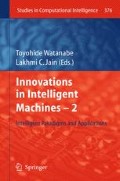Abstract
Exploratory Learning Environments allow learners to use different strategies for solving the same problem. However, not all possible strategies are known in advance to the designer or teacher and, even if they were, considerable time and effort would be required to introduce them in the knowledge base. We have previously proposed a learner modelling mechanism inspired from Case-based Reasoning to diagnose the learners when constructing or exploring models. This mechanism models the learners’ behaviour through simple and composite cases, where a composite case is a sequence of simple cases and is referred to as a strategy. This chapter presents research that enhances the modelling approach with an adaptive mechanism that enriches the knowledge base as new relevant information is encountered. The adaptive mechanism identifies and stores two types of cases: (a) inefficient simple cases, i.e. cases that make the process of generalisation more difficult for the learners, and (b) new valid composite cases or strategies.
Access this chapter
Tax calculation will be finalised at checkout
Purchases are for personal use only
Preview
Unable to display preview. Download preview PDF.
References
Papert, S.: Mindstorms: children, computers and powerful ideas. BasicBooks, New York (1993)
Piaget, J.: The Psychology of Intelligence. Routledge, New York (1950)
de Jong, T., van Joolingen, W.: Scientific discovery learning with computer simulations of conceptual domains. Review of Educational Research 68, 179–202 (1998)
Kirschner, P., Sweller, J., Clark, R.: Why minimal guidance during instruction does not work: An analysis of the failure of constructivist, discovery, problembased, experiential and inquiry-based teaching. Educational Psychologist 41(2), 75–86 (2006)
Cocea, M., Magoulas, G.D.: Task-oriented modeling of learner behaviour in exploratory learning for mathematical generalisation. In: Proceedings of the 2nd ISEE workshop, in conjunction with AIED 2009, pp. 16–24 (2009)
Pearce, D., Mavrikis, M., Geraniou, E., Gutiérrez, S.: Issues in the Design of an Environment to Support the Learning of Mathematical Generalisation. In: Dillenbourg, P., Specht, M. (eds.) EC-TEL 2008. LNCS, vol. 5192, pp. 326–337. Springer, Heidelberg (2008)
Dorer, W.: Forms and means of generalisation in mathematics. In: Bishop, A., Mellin-Olsen, S., van Dormolen, J. (eds.) Mathematical Knowledge: Its Growth through Teaching, pp. 63–85. Kluwer Academic Publishers, Dordrecht (1991)
Harel, G., Tall, D.: The general, the abstract and the generic in advanced mathematics. For the Learning of Mathematics 11(1), 38–42 (1991)
Moss, J., Beatty, R.: Knowledge building in mathematics: Supporting collaborative learning in pattern problems. International Journal of Computer-Supported Collaborative Learning 1(4), 441–465 (2006)
Mason, J., Haggarty, L.: Aspects of Teaching Secondary Mathematics: Perspectives on Practice. In: Generalisation and algebra: Exploiting children’s powers, Routledge Falmer and the Open University, pp. 105–120 (2002)
Geraniou, E., Mavrikis, M., Hoyles, C., Noss, R.: A constructionist approach to mathematical generalisation. In: Joubert, M. (ed.) Proceedings of the British Society for Research into Learning Mathematics. BSRLM Proceedings, vol. 28(2) (2008)
Hoyles, C., Küchemann, D.: Students understanding of logical implication. Educational Studies in Mathematics 51(3), 193–223 (2002)
Bednarz, N., Kieran, C., Lee, L.: Approaches to algebra: Perspectives for research and teaching. In: Bednarz, N., Kieran, C., Lee, L. (eds.) Approaches to algebra: Perspectives for research and teaching, pp. 3–12. Kluwer Academic Publishers, Dordrecht (1991)
Noss, R., Healy, L., Hoyles, C.: The construction of mathematical meanings: Connecting the visual with the symbolic. Educational Studies in Mathematics 33(2), 203–233 (1997)
Noss, R., Hoyles, C.: Windows on Mathematical Meanings: Learning cultures and computers. Kluwer Academic Publishers, Dordrecht (1996)
Warren, E., Cooper, T.J.: Generalising the pattern rule for visual growth patterns: actions that support 8 year olds’ thinking. Educational Studies in Mathematics 67(2), 171–185 (2008)
Malara, N., Navarra, G.: ArAl Project: Arithmetic pathways towards favouring pre-algebraic thinking. Pitagora Editrice, Bologna (2003)
Küuchemann, D.: Childrens Understanding of Mathematics, pp. 11–16. John Murray, London (1991)
Duke, R., Graham, A.: Inside the letter. Mathematics Teaching Incorporating Micromath 200, 42–45 (2007)
Kolodner, J.L.: Case-Based Reasoning, 2nd edn. Kaufmann Publishers, Inc., San Francisco (1993)
Anguita, D.: Smart adaptive systems: State of the art and future directions of research. In: Proceedings of the 1st European Symposium on Intelligent Technologies, Hybrid Systems and Smart Adaptive Systems, EUNITE 2001, pp. 1–4 (2001)
Mitra, R., Basak, J.: Methods of case adaptation: A survey: Research articles. International Journal of Intelligent Systems 20, 627–645 (2005)
Aksoy, S., Haralick, R.: Feature normalisation and likelihood-based similarity measures for image retrieval. Pattern Recognition Letters 22(5), 563–582 (2001)
Author information
Authors and Affiliations
Editor information
Editors and Affiliations
Rights and permissions
Copyright information
© 2012 Springer-Verlag Berlin Heidelberg
About this chapter
Cite this chapter
Cocea, M., Gutierrez-Santos, S., Magoulas, G.D. (2012). Case-Based Reasoning Approach to Adaptive Modelling in Exploratory Learning. In: Watanabe, T., Jain, L.C. (eds) Innovations in Intelligent Machines – 2. Studies in Computational Intelligence, vol 376. Springer, Berlin, Heidelberg. https://doi.org/10.1007/978-3-642-23190-2_12
Download citation
DOI: https://doi.org/10.1007/978-3-642-23190-2_12
Publisher Name: Springer, Berlin, Heidelberg
Print ISBN: 978-3-642-23189-6
Online ISBN: 978-3-642-23190-2
eBook Packages: EngineeringEngineering (R0)

